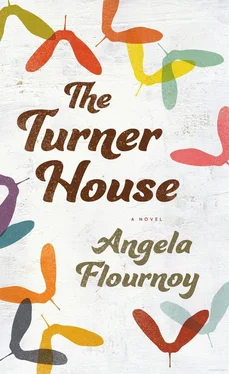“Charles? Were there more times than just those two?”
He didn’t like how frequently Alice used his name. It was a way to keep their talks formal, which was fine, but he also thought it was a way to condescend.
“I don’t see the point of waiting this long to talk about the haint if you were never going to believe me.”
“It’s not important whether I believe or don’t believe, Charles. I’m curious if there were more times than just those two.”
How many times did a body have to collide with the paranormal for it to count for the science-minded? Three? Twelve?
“Fourteen years old to sixty-four years old,” Alice said. “That’s a pretty long gap, don’t you think?”
It didn’t seem like a long time to Cha-Cha. Fifty years, a wife, two children, one grandchild; they were not here one day, then all here the next.
“Do you believe in God, Alice?”
“Well, I don’t usually discuss my beliefs, but”—Alice put her pen down on the pad—“I’m an atheist, Charles. Why do you ask?”
“An atheist?” Cha-Cha had never known an atheist. When his son Chucky was thirteen he’d declared himself an atheist, but Tina had prayed and whupped it out of him. “Did you ever believe in God?”
“I guess I thought I believed at one point,” Alice said. “But now I don’t think I ever truly did.”
“Oh.”
“Why do you ask?” She leaned back in the chair but kept her arms on the desk, as if leaving her body open for attack.
Alice wasn’t exactly Cha-Cha’s friend, but she wasn’t like anyone he’d ever met before, and he didn’t want to throw their rapport out of sync.
“I don’t know,” Cha-Cha said. “There are ghosts all through the Bible, and angels, and even demons, not to mention the Holy Ghost himself.”
“I’m not sure how that answers my question,” Alice said.
“I’m trying to explain.”
“Okay, explain then,” Alice said.
“Thing is, after that first time on Yarrow, maybe I saw that blue fill my bedroom, and maybe sometimes I felt a certain way, like someone was watching me, but what I would do is hop out the bed, get on my knees, and pray. And after fifteen minutes or so of that, I wouldn’t feel or see anything in my room.”
Alice scribbled a quick note, possibly a single word, in her notebook.
“So you’ve been doing this off and on for fifty years?”
Cha-Cha certainly hadn’t prayed on his knees, outside of his bed, in ages. Tina prayed like that most nights, and other nights she sequestered herself in their walk-in closet for a half hour, the door closed, the light switched off, trying to get that much closer to God. But just because he didn’t hit the floor in prayer didn’t mean the haint never paid him a visit. When Cha-Cha was seven he’d had the job of cleaning up the kitchen at the end of the night. He washed whatever dishes remained after dinner, swept the floor, and wiped down the counters. If he waited too late to take care of it, he’d flip on the kitchen light and find cockroaches scampering across the counter, some as long as his thumb, claiming their territory for the dark hours. In the beginning it had made him sick, but he learned to tolerate fighting the insects in silence as his siblings and parents slept. The haint might be similar, something that had always been around but no longer an out-of-the-ordinary nuisance. Except, of course, when it tried to kill him.
“I don’t know. Maybe,” Cha-Cha said. “Maybe I’ve seen it, or hints of it a few times over the years.”
“And you’ve never told anybody about it again? Not even your father?”
Cha-Cha laughed.
“No, especially not my father. He said there weren’t any haints in this city. I wasn’t gonna change his mind.”
Alice sat with this last statement a minute and munched on her bottom lip, a habit Cha-Cha noticed she indulged in when devising some sort of plan for him. Lip munch: you need to hold your siblings accountable when they say they’re going to pitch in with your mother and don’t; it’s only fair. Or, lip munch: I think you could use a hobby, Charles, maybe something active, like swimming. Otherwise she kept her face very still.
“This is what I think,” she said. “I think you need to pay more attention these next few weeks, find out if this thing is still appearing for you, in any kind of form. Think about patterns. Do you feel a certain way when it shows up? What did you eat that day? Take a note of those things. Then we’ll have a better sense of what to do next.”
“Okay,” Cha-Cha said.
“Good, and maybe later, when you’re ready, you can take a visit to your mother’s house and spend some time in that room. Could be that you have some loose ends there that need tying up.”
“Maybe,” Cha-Cha said, but he had no desire to do anything to get closer to the haint. It seemed foolhardy, like thrusting your hand in a faulty garbage disposal, or parking a brand-new Cadillac on the street on the east side overnight.
Whereas the house on Yarrow Street sat high and narrow, full of straight lines, steep inclines, and sharp corners, Cha-Cha and Tina’s house on the edge of Franklin Village sat low, round, and wide. The kitchen—which bled into the dining room, which connected to the den—was at the very center of the building. From the den a hallway led to the house’s five bedrooms, 3.5 baths, garage, and finished basement. If you kept going, the kitchen inevitably reappeared. Francis Turner suggested such a layout, arguing that in his old age Cha-Cha would want a house that went out and around instead of up and down. It was optimistic advice from a man who in the end never lived to see seventy. In the wake of his accident and bringing Viola here to stay, Cha-Cha appreciated his father’s wisdom. He’d bought the land at a considerable discount; the old house was destroyed in a fire, and the owners opted not to rebuild. He took his time planning the layout, aware that with only one above-ground story his neighbors’ estates would dwarf his own. He made sure to add touches elsewhere to help his house fit in—a generous back deck, large bay windows, a wide, curving driveway. Now, a few of his neighbors’ places featured foreclosure and For Sale signs on the lawns. Cha-Cha’s house still stood, deep in the heart of a cul-de-sac and on its way to free and clear.
“Russell’s been holed up in Mama’s room since he got here,” Cha-Cha said. “I tried to listen through the door, but damnit if they weren’t in there whispering. ”
He leaned into the kitchen from the front entryway.
“Please, Cha-Cha. You know your brother couldn’t whisper at a funeral,” Tina said. Every surface in the kitchen supported a tray of pepper-speckled raw chicken parts. She moved from tray to tray, shaking seasoning salt from one hand and garlic powder from the other.
“All I know is that he better be in here in time for this meeting.” Cha-Cha hovered in the kitchen entryway lest Tina put him to work. “If he’s gonna show up for the weekend unannounced, he can at least help tend to some business.”
“I keep telling you he sent us an email saying he was coming,” Tina said.
“That man sends an email every hour,” Cha-Cha said. “How am I supposed to wade through all them chain letters for the real ones?” He hurried as best he could manage through the kitchen and into the dining room, where he tried to look busy with a stack of receipts.
“The subject line was ‘coming to Detroit this weekend.’ You had to have seen it.”
“That coulda meant that God’s coming to Detroit for all I know. Half those emails are always tryna force me to do something or face hellfire. They’ll have some scripture, then talkin about ‘click this if you love God,’ or ‘if you don’t forward this, you’ll be damned.’”
Читать дальше












